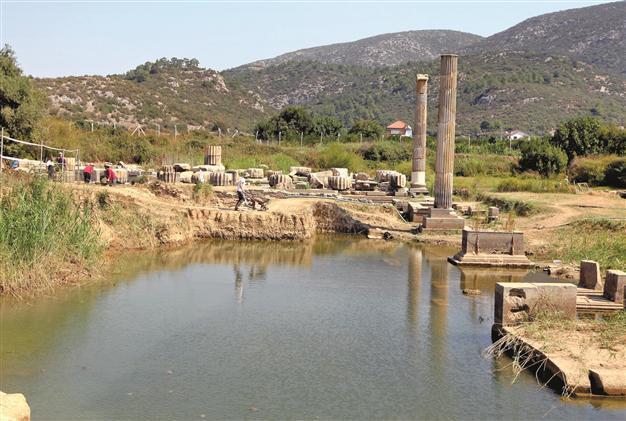2000-year-old question: When will next earthquake happen?
İZMİR - Anadolu Agency

Klaros was founded on top of a fountain of boiling water and in the middle of an area surrounded by laurels. Oracles would be brought there in darkness. AA Photo
Underway for over a century, the excavations in the Klaros Oracle Center, located in the province of Ahmetbeyli in İzmir’s Menderes, have exposed some dazzling truths: One of the frequently asked questions in the oracle center in the past related to when the next earthquake would happen.Professor Nuran Şahin, the head of the Klaros excavation and a member of Ege University’s Classical Archaeology Department, said they had discovered a number of interesting artifacts in Klaros, the oldest of the three most important oracle centers in antiquity.
People with Pagan beliefs would visit oracle centers to inquire God’s messages about their personal lives as well as problems about their province and country. Şahin said the dominant belief at the time was that bad luck would be summoned if one did not consult with the oracles when establishing a new city or making an important decision about the country.
Klaros was founded on top of a fountain of boiling water and in the middle of an area surrounded by laurels. Oracles would be brought there in darkness and away from all human contact; they would transmit the incoming questions to God and the answers to the clergy, according to Şahin. “In this oracle center, which is dedicated to Apollo, the god of prophecy, representatives from delegations that governed the cities asked questions. When oracles came out of the room where they had fasted for 24 or 48 hours and where water was consistently boiling, the clergyman whispered the question in one oracle’s ear. The oracle then entered back the room, broke the fast, washed his hands and face, and asked the question to God. He later told the answer, which he received through inspiration or revelation, to the clergyman. Those answers that were about cities and countries were inscribed on tablets, and the tablets were erected in front of the temples,” he said.
After conquering Kadifekale, Alexander the Great also consulted with the Klaros oracles about a dream he had when sleeping under a tree in the region. Legend has it that the answer Alexander received was that the happiness and wealth of people of İzmir would quadruple once they settled around the Pagos Mountain, alongside the holy river of Meles. Upon this answer, Alexander established the city of New Smyrna in the place described in the prophecy.
Şahin said oracles were not usually clear in their prophecies and that many representatives had to come over and over again to clarify their answers. “Among the most ardent visitors of the oracle center were the representatives from İzmir. In that region where earthquakes had frequently occurred, one of the biggest questions was about earthquakes. As we understand from the tablets, representatives from İzmir would come to the oracle center after every earthquake and ask such questions: Will it happen again? When will it be? How many people will die? Will there be any plague or conflagration? Since wrong answers to these questions would damage the reputation of the oracle center, the answers were always ambiguous. Beginning with the questions that came after the earthquake in 152 B.C., oracles always responded that God is angry with such kind of questions and refuses to answer them. Apart from the destructive power of the earthquakes, important aspects of the cities’ struggle with disasters in the past were rodent invasions and plagues that followed them,” he said.
With the spread of Christianity in the fourth century A.D. the oracle center fell out of favor, Şahin added. The reason that the heads of monuments found in the oracle center were missing could be explained by the fact that after Christianity’s chiding of such places, the monuments were demolished.
Ceremony by the New Apollonians
Due to its historical significance, the Klaros Oracle Center now attracts many visitors from around the world, including many with unconventional beliefs. Şahin reported that a group of people from the U.S. that calls itself the “New Apollonians” recently performed religious ceremonies in the vicinity of the oracle center. “They did not inform anybody about what exactly they did, although they said they called themselves ‘New Apollonians.’ They performed ceremonies on a hill. A lot of people who want to meditate have recently flocked to the oracle center. They say that the bio-energy in the region is really powerful, but as someone who excavated in the region for 30 years I have difficulty making sense of these comments,” he said.
















